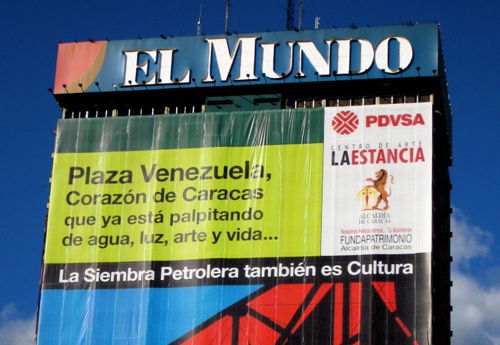In the Name of Sovereignty
by Israel Centeno and translated by Kelly Harrison / May 21, 2013 / No comments
The story of Venezuela’s accelerating economic crisis.

PDVSA billboard reading 'Plaza Venezuela, the heart of Caracas is already pounding with water, light, art and life...This is also the oil sowing culture.' Photo: gwbstr via Flickr.
In January 1959, Fidel Castro visited Caracas and saw El Ávila—a proper mountain, not just a hill—as a fort from which he could deploy a continental guerrilla force that would travel across the backbone of South America, from the northern coast down to the Chilean Patagonia. Only a year before Venezuela had put an end to General Marcos Pérez Jiménez‘s dictatorship by means of a civil movement, and with the support of leaders who were fresh from the military academy Rómulo Betancourt had already become president-elect by the time of Castro’s visit. This visit would come to determine the future relationship between both leaders and both political projects (Castro’s communism and Betancourt’s “Venezuelan Democracy”), following the response that Betancourt gave Castro in the only meeting they ever had: Venezuela will not give away her oil; she will sell it.

- From his lonely watch post Albert Camus asked who among us has not experienced exile yet still managed to preserve a spark of fire in their soul. “We’re all alone,” Natalia Sedova cried in exile on hearing of her husband Leon Trotsky’s affair with Frida Kahlo. In his novel Night Watch, Stephen Koch follows the incestuous love affair of David and Harriet, wealthy siblings watching the world from their solitary exile. Koch’s writing, Camus’s theories, and Trotsky’s affair all come back to exile and lead me to reflect on the human condition. From my own vantage point, my Night Watch, I will reflect on my questions of exile, writing, and the human condition.

- Israel Centeno was born in 1958 in Caracas, Venezuela, and currently lives in Pittsburgh as a Writer-in-Residence with City of Asylum/Pittsburgh. He writes both novels and short stories, and also works as an editor and professor of literature. He has published nine books in Venezuela and three in Spain.
This answer gave rise to aggressiveness on the part of the caudillo of the Sierra Maestra, and he began to interfere directly in Venezuelan matters. He didn’t stop, twisting and turning, until Venezuela, driven unquestionably by Hugo Chávez, literally ended up giving her oil to Castro at the expense of her ideals. Around one hundred thousand barrels a day, according to some sources. All in the name of a new relationship—the same one that the victorious Cuban guerrilla leader had tried to sell to Betancourt over fifty years before—based on “solidarity, fraternity and anti-imperialism.”
The future of many Latin American nations has been mortgaged in the name of the anti-imperialist fight and national sovereignty. Simply dispense with certain premises, such as an immediate dependence on Cuba and the sacrifice of the nations’ interests for Soviet interests—and, following the dissolution of the Soviet Union, for European tourism capital—in order to orbit within a geopolitical game, or other, darker games, practically at the level of an underling.
Bolivarian Venezuela has tried to reclaim her sovereignty by means of the same nationalistic and anti-imperialist rhetoric as the Castros’ Cuba. However, the time has come to face facts: Never before has Venezuela been in such a deplorable and compromised condition, nor in so much debt, purely in the interest of substantial capital resources. With the State acting as manager, the Bolivarian leadership has entrusted the future of the country, through the China-Venezuela Fund and other such arrangements, to one of the most aggressive, and perhaps one of the most savage, emergent capitalist economies. This alliance with China is not unique; the dedication to sovereignty—always in the name of sovereignty—has diversified in the same way that corruption and illegal businesses have diversified. Not only China, but Brazil, Iran, Russia, and the United States of America have a high-powered dynamism in Venezuela, a country that declares its sovereignty with grandiloquence, yet needs to burn money in order to uphold colossal levels of populism inside and outside its borders. To further illustrate the Venezuelan tragicomedy, it should be added that Venezuela imports 80% of what it consumes and, nowadays, is a country that’s in pieces, flaunting empty window displays devoid even of basic produce.
On such premises, and with considerable amounts of cash, the glorious revolution of the sons of Bolívar is being sold on the international market.
We no longer sell our oil; we pay and we get into debt with it. This is the high cost of the model of Bolivarian sovereignty.




